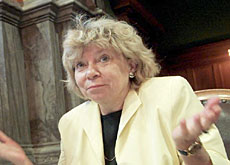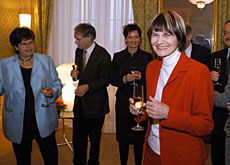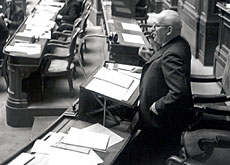Elections unlikely to alter Swiss politics

In most democracies, elections are eagerly awaited as they open the way for the formation of a new government.
But Switzerland’s elections on Sunday are unlikely to have much influence in the short term over the composition of the government.
Italians, French and Germans with an interest in politics find it hard to understand why the make-up of the Swiss government has remained unchanged since 1959.
In Europe it is usual for parties to alternate between being in government and being in opposition. The extremely stable Swiss model arouses much curiosity and surprise, even though some other countries also have governments of consensus.
“In Switzerland all the big parties remain in power after the elections, even if they have lost votes,” says Adrian Vatter, a political science professor at the University of Bern.
“This system makes the Swiss elections dull,” the professor adds. “Elections are much more interesting in countries where the makeup of the future government depends on the results of the ballot.”
In fact, the Swiss government is not formed by a parliamentary majority elected on the basis of a manifesto for government. It is formed following agreement between the country’s four main parties.
The people decide
With all the main parties represented in government, no major clashes between majority and opposition parties take place in the Swiss parliament. Instead, in most cases, the Centre-right and Centre-left work on the basis of compromise to draw up legislation.
And this culture of consensus is not confined to the politicians. Before even presenting a bill on a given subject, the government canvasses the opinion of different interested parties through a “consultation process”.
Despite the politics of consensus, it can happen that minority parties in parliament or sections of civil society think their views have not been properly taken into account. In this case they can lodge an appeal with the supreme judge – the people.
To call a referendum on a law, 100,000 signatures must be gathered within 100 days.
In recent years, leftwing and rightwing parties have had recourse to this political instrument on numerous occasions, in the case of the Left to try to stop the dismantling of the welfare system, and in the case of the Right to prevent Switzerland further opening up to the world.
With such a political system, one could argue that in Switzerland it is the people who have control over the workings of government. It is the Swiss themselves who assume the role played by the opposition in other countries.
“Control is exercised through direct democracy,” confirms Adrian Vatter. “The role of opposition is assumed by the voters.”
Politics of consensus
The political analyst concedes that the government changes that take place in other countries lead to more political renewal, which is a positive thing.
However, there is no reason to believe that such a system works better than a politics of consensus. “Where parties alternate between a majority and an opposition role it is not always possible to conduct a coherent policy,” says Vatter.
What is true is that in comparison with other countries, this autumn’s federal elections in Switzerland will not have as great an impact. But it is also true that in no other part of the world do voters have as much direct influence on politics.
swissinfo, Andrea Tognina
The Swiss government consists of a cabinet made up of seven members, each of whom heads up a ministry.
Cabinet posts are shared out according to the so-called “Magic Formula”, an informal power sharing agreement reached among the four main parties in 1959.
Three of the parties have two cabinet posts each (Social Democrats, Christian Democrats, Radicals), while the fourth – the Swiss People’s Party – has one.
Cabinet ministers are nominated by their parties and are elected at a joint session of parliament.

In compliance with the JTI standards
More: SWI swissinfo.ch certified by the Journalism Trust Initiative












You can find an overview of ongoing debates with our journalists here . Please join us!
If you want to start a conversation about a topic raised in this article or want to report factual errors, email us at english@swissinfo.ch.